An inspiring unedited true story from the author of History of Eufaula, published in 1930
SCROLL DOWN TO CONTINUE . . .
True Life Story of
Eufaula’s Outstanding Writer
Eugenia Persons Smartt
Author of “History of Eufaula” Published 1930
Written March 8, 1939
by
Gertha Corric
Federal Writers Project (WPA)
She has had every odd against her, the most devastating of all, tuberculosis, but there has never been a braver soul. She is one of Eufaula’s best known and most capable writers. (continued below)
“You say you wish to write a story of my life because I am Eufaula’s outstanding historian and also one of great executive ability? I know I have written Eufaula’s largest, most complete and authentic history, and I agree that I must have inherited executive ability to carry on in the face of so many rebuffs, still I thought one of great executive ability would amass wealth to show for it, and I am still trying to “go over the top,” Just “hanging on” so to speak.
Probably you would like to know of the days I used to ride horseback and on a side saddle too, which I think required as much skill as a champion golfer of 1939. On one of these rides my horse ran away when I let him get the rein as he was drinking at a branch. Never being able to regain the rein, I clung to the saddle, (thanks that it was a good one) while he carried me, I knew not where, and my long hair had gone with the wind.
I held on then and have been holding on ever since, and managing the little that came my way just as I managed to cling to that horse.
Born in Barbour County
I was born in Barbour County, at the home of my parents, Eugene Carter Persons and Frances Elizabeth Henry Persons, about twelve miles from Eufaula, Alabama. The little house my parents built when they were married Nov. 9, 1878, is still standing on the 330 acre farm that my father inherited, and which was part of lands that had been in the Persons family over 100 years. It is a four room house with wide hall, front and back porch, and kitchen. The log smoke house is still standing in the back yard. The home overlooks beautiful scenery as it stands on a high bluff.
I did not inherit wealth, for the wealth of both families was swept away with the War Between the States, but I am proud of my ancestors. My mother was a descendant of the immortal Patrick Henry. The name was originally spelled Henrich, of the Norman French, they having come with the Conqueror of England, settling in Scotland. The three brothers, Alexander, Patrick and John migrated from Aberdeen, Scotland. John’s son, Patrick, was named for his brother, the Reverend Patrick Henry. John, the father, settled in Virginia prior to 1730. He was commanding officer of Hanover Company militia and celebrated extravagantly the coronation of King George III, little dreaming his son would be a leading influence to separate America from His Majesty’s dominions.
John Benjamin, my great grandfather, served in the War of 1812, as first Lieut. and later as Capt. My grandfather, Doctor John Benson Henry, died at the age of thirty-five, leaving the promise of a brilliant future and one year later, his beautiful wife, Catherine Ivey Henry, died leaving sevn orphan children, the oldest twelve or thirteen years of age.
Educated at Glennville Military Academy
The Persons family were descendants of William Persons, who served as M. C. from N. C. 1744-1776. They came from England and made noteworthy record in N. C. where a county is named in their honor. My grandfather, Dr. James Turner Persons amassed a fortune before the War Between the States, and retired from practice, but the losses incurred during the War necessitated his returning to practice in old age. With slave labor he built a great part of the first railroad from Hurtsboro to Columbus. My father was impressed with the building of this road, he said, because two young negro slaves with whom he used to play were hauling gravel. Just for fun one of the boys pulled the mules tail and he kicked and killed him.
My father was educated at Glennville Military Academy, Glennville, Alabama. This was a leading southern college then. I have his Ray’s Arithmetic and wouldn’t part with it. He used to say, “Get my Ray’s Arithmetic and I can show you anything,” and he could. Mother had private teachers during her younger days, and later sent off to school to study music and dancing.
My parents were both good looking. Mother a blonde, fair, with blue eyes and reddish golden hair, and father dark brown hair and brown eyes. I was not the first child. Two died in infancy. After I was born father used to say, “She got her looks from her father.” Anyway I had long brown curls and large brown eyes. My little brother Henry was like Mother.
Father was inclined to be witty but mother was serious. He would often come in and tell some yarn and she would immediately correct him. He has often laughed and told her how he came home once with a whiskey bottle under his arm, and staggered in saying, “Be-Be-Betty, I love you.” She always said she never would put up with foolishness, so she either believed he was drunk or foolish. Anyway she gave him such a push that he almost fell, dropped and broke his bottle of whiskey he had for egg-nog, and thus ended his “drunkenness.” Father was very proud of me. He used to make me “look mad” at people and he enjoyed it as much as they did.
After spending the first six years of my life at the little home, my parents decided to move to Eufaula. Labor was hard to get because of the emmigration of negroes to Texas, and many tramps roamed around. I remember how frightened I was once when mother had to get her pistol to make one leave that persisted in coming in. She was very brave.
Never really ill
I was sent to school at seven years of age, and all through grammar school I stood high, winning first, second and third honors each year. My masterpiece, “Five Little Peas In a Pod” was adjudged the best over to be written by a first grade pupil. One day a friend quietly placed a boy’s cap on my head in school. Teacher noticed it before I could remove it and said, “Gena, five demerits.” Now five demerits would have killed me I thought, so I immediately told her I did not put it on, and she believed me, for I never would tell a lie.
It was really a joy for me to get sick because I was never very ill. And when I had a slight “buillious attack,” as the doctor said, I had the great joy of my mother’s whole attention. She read to me, fixed delicicies (sic), and never left me until I was fully well and back in school. She lived according to the highest ideals and taught those ideals to her children. When convalezing (sic) from a little spell like this I remember the beautiful talks she gave me that were indellibly (sic) stamped on my memory and no doubt shaped my future. Children are wiser today than in my day. They live too fast and grow up by the time they are ten or twelve years of age. They just don’t have time to be very serious. I was a very conscientious child and serious about all things. I enjoyed childhood days with dolls, doll weddings, bicycle rides and such, but I pondered deeply over the great future. One day while studying on the front steps I noticed two old ladies pass. Probably I had seen them before but not the two to-gether. They both seemed very old, wore black dresses and black poke bonnets. I was so deeply impressed with the horror of old age that I prayed that night and every night until I was very much older, “Dear God, please don’t let mother, father, Bud or me ever get old like Mrs. – and Mrs. –.” Now I did not mean I wanted to die young. My idea was to live to be old but not stooped and old looking.
When father was assistant postmaster, I was sent to the College here, where I entered freshman class. Girls did not first graduate from high school as they do to-day. My friends went to Union Female College where we all graduated after four happy, as well as instructive years. Our teachers were from the finest colleges of the North, and I am just as proud of my diploma as I would be if it were from any college, because I know we did good work and the curriculum was high, although some of my friends said they weren’t proud of theirs because the very year we were to graduate in may the college was forced to close in April due to a bank failure in our town. We had really completed our years work but were denied the commencement with its art exhibits, musicals and plays.
Very dear to me always was my mother’s sister, and her family. Her husband, Uncle Earnest Corker was a beautiful writer, as was my father’s sister’s husband, Uncle Wilton Burton of Auburn, Ala.; whose writings today live. They both were a great inspiration to me and I thought it wonderful to create something from “airy nothing” as one of them said.
Girls not taught special vocation
Girls in 1903 were not taught any special vocation for they were not supposed to work except as teachers. I was so anxious to do something worth while that I opened my first free studio in my home and invited my friends to be my free pupils. I had never studied but took my first step as art teacher just the same.
One night I was invited to a spend-the-night party at a friend’s home and it was there that I met my future husband, salesman for Proctor-Gamble Co. I remember the dress I wore, a pink floral organdie which was truly stylish and beautiful for it was made by the most beautiful hands in the world and fashioned from an artist’s mind—–my mother’s.
There was much work on a dress in 1904 when I was a debunte, (sic) yards and yards of ruffling and skirts were skirts in those days and not just pillow cases. We were beginning to ruff and ruin our naturally beautiful hair and pull it back over those horrible “rats” until we had a swell pompadour. All girls wore underwear, and the cotton underskirt was somewhat like a life-preserver as it rolled around the hip. Drawers were starched stiff with fluted ruffles. A stiff whalebone corset was laced until our breath most left us. Thus it was, with a small waist and large hips we were in style. The bustle was an added attraction. Then at least three long petticoats were put on. How often I have stood and asked some one, “Can you see through me?” If the answer were negative I went on, but if not, on went another petticoat. Weren’t we swell? High neck dresses, large busts, long sweeping skirts, huge bustles, the “June dip” and a hat with several large plumes. We never would admit that our left arm tired of continually holding that long sweeping skirt when we walked.
On a beautiful June day in 1905, radiant in a wedding gown of white crepe-de-chene, with an only jewel, a crescent of diamonds, gift of the groom, I pledged my troth to the man I so dearly loved, at a lovely church wedding. My friends through school days were my brides-maids. My father looked so handsome as he gave me away and I will never forget mother, as she sat with tears in her eyes, looking like an angel in a gown of orchid.
This photograph at the Alabama Department of Archives and History is believed to be mislabeled Mrs. Virginia P. Smartt of Eufaula ca. the 1930s. by the Archives Q1481 instead of Eugenia P. Smartt
After the wedding we went to my husband’s Tennessee home where a double reception was given in honor of the bride and groom of 1905 and the bride and groom of 1885, on my husband’s parents silver anniversary.
After a delightful visit we returned home where mother and father were so glad to see us and we were the happiest couple on earth. My husband was a wonderful man, and a very fine salesman, and life seemed quite auspicious. My parents and I lived together because he was away except for week-ends.
Just a little over two years elapsed when the happiest event of our lives occurred, for little princess Eugenia came to live with us. She was a beautiful baby with brown eyes and ringlets of golden brown hair, and a smile that lasted. She was born in January and the first Christmas was spent in Tennessee. The next Christmas was to be spent at home, but too often those supremely happy, with everything so promising, are not allowed to carry out that beautiful life. So the Christmas before my baby was two years old this precious husband suddenly passed into the Great Beyond. All future hope and ambition passed from me and I cared not to live. Next day when my baby was brought to me she said, Dau-dau, I lub oo”. (She called me daughter as my parents did.) Looking into those baby eyes, I burst into tears, and then resolved to spend my life for her and my parents, who offered to do for her as their own.
Thus from the Christmas of 1909, just in my early twenties I was destined to begin a life of many sorrows with the joys of life but few.
(Continued)


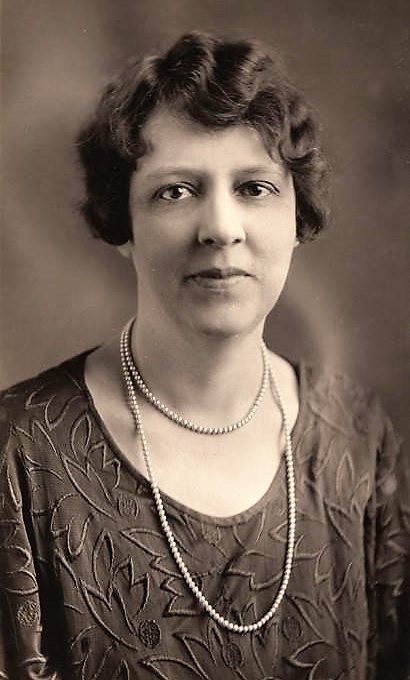
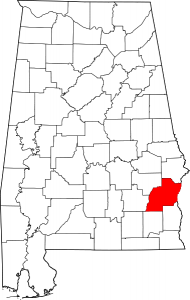
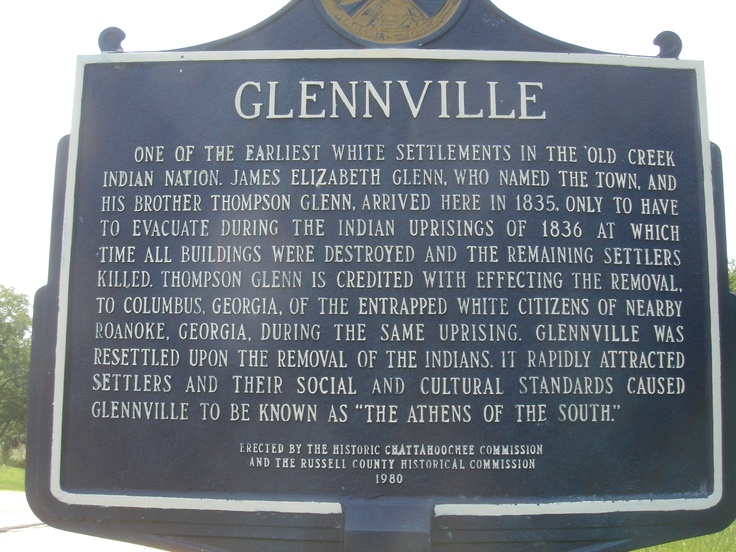
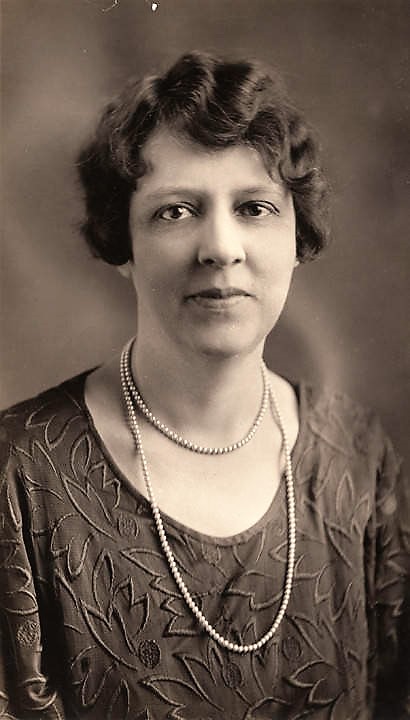
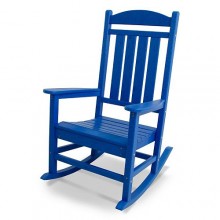
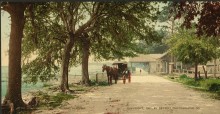
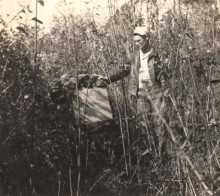
Pam, I don’t see you listed as a Patreon member. Did you sign up under another email address. Contact us at [email protected] and we will try to resolve your problem.